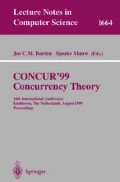Abstract
We introduce a hypergraph-based process calculus with a generic type system. That is, a type system checking an invariant property of processes can be generated by instantiating the original type system. We demonstrate the key ideas behind the type system, namely that there exists a hypergraph morphism from each process graph into its type, and show how it can be used for the analysis of processes. Our examples are input/output-capabilities, secrecy conditions and avoiding vicious circles occurring in deadlocks.
In order to specify the syntax and semantics of the process calculus and the type system, we introduce a method of hypergraph construction using concepts from category theory.
Access this chapter
Tax calculation will be finalised at checkout
Purchases are for personal use only
Preview
Unable to display preview. Download preview PDF.
References
Martín Abadi. Secrecy by typing in security protocols. In Theoretical Aspects of Computer Software, pages 611–638. Springer-Verlag, 1997.
Michel Bauderon and Bruno Courcelle. Graph expressions and graph rewritings. Mathematical Systems Theory, 20:83–127, 1987.
Gérard Berry and Gérard Boudol. The chemical abstract machine. Theoretical Computer Science, 96:217–248, 1992.
Chiara Bodei, Pierpaolo Degano, Flemming Nielson, and Hanne Riis Nielson. Control flow analysis for the pi-calculus. In CONCUR’ 98, pages 84–98. SpringerVerlag, 1998. LNCS 1466.
Roy L. Crole. Categories for Types. Cambridge University Press, 1993.
H. Ehrig. Introduction to the algebraic theory of graphs. In Proc. 1st International Workshop on Graph Grammars, pages 1–69. Springer-Verlag, 1979. LNCS 73.
Annegret Habel. Hyperedge Replacement: Grammars and Languages. SpringerVerlag, 1992. LNCS 643.
Kohei Honda. Composing processes. In Proc. of POPL’96, pages 344–357. ACM Press, 1996.
Kohei Honda and Nobuko Yoshida. Combinatory representation of mobile processes. In POPL’ 94, pages 348–360. ACM Press, 1994.
Naoki Kobayashi. A partially deadlock-free typed process calculus. In LICS’ 97, pages 128–139. IEEE, Computer Society Press, 1997.
Naoki Kobayashi, Benjamin C. Pierce, and David N. Turner. Linearity and the pi-calculus. In POPL’ 96, pages 358–371. ACM SIGACT/SIGPLAN, 1996.
Yves Lafont. Interaction nets. In POPL’ 90, pages 95–108. ACM Press, 1990.
R. Milner, J. Parrow, and D. Walker. A calculus of mobile processes, Part I. Tech. Rep. ECS-LFCS-89-85, University of Edinburgh, Laboratory for Foundations of Computer Science, 1989.
Robin Milner. Operational and algebraic semantics of concurrent processes. In Jan van Leeuwen, editor, Formal Models and Semantics, Handbook of Theoretical Computer Science, volume B, pages 1201–1242. Elsevier, 1990.
Robin Milner. The polyadic π-calculus: a tutorial. Tech. Rep. ECS-LFCS-91-180, University of Edinburgh, Laboratory for Foundations of Computer Science, 1991.
Robin Milner. Pi-nets: a graphical form of pi-calculus. In European Symposium on Programming, pages 26–42. Springer-Verlag, 1994. LNCS 788.
Uwe Nestmann and Martin Steén. Typing confluence. In ERCIM Workshop on Formal Methods in Industrial Critical Systems, pages 77–101, 1997.
Joachim Parrow. Interaction diagrams. Nordic Journal of Computing, 2:407–443, 1995.
Benjamin Pierce and Davide Sangiorgi. Typing and subtyping for mobile processes. In LICS’ 93, pages 376–385, 1993.
Antonio Ravara and Vasco T. Vasconcelos. Behavioural types for a calculus of concurrent objects. In Euro-Par’ 97. Springer-Verlag, 1997.
David Turner. The Polymorphic Pi-Calculus: Theory and Implementation. PhD thesis, University of Edinburgh, 1995. ECS-LFCS-96–345.
P. Urzyczyn. Positive recursive type assignment. In J. Wiedermann and P. Hájek, editors, Mathematical Foundations of Computer Science 1995. Springer-Verlag, 1995. LNCS 969.
Nobuko Yoshida. Graph types for monadic mobile processes. In FST/TCS’ 96, pages 371–386. Springer-Verlag, 1996.
Author information
Authors and Affiliations
Editor information
Editors and Affiliations
Rights and permissions
Copyright information
© 1999 Springer-Verlag Berlin Heidelberg
About this paper
Cite this paper
König, B. (1999). Generating Type Systems for Process Graphs. In: Baeten, J.C.M., Mauw, S. (eds) CONCUR’99 Concurrency Theory. CONCUR 1999. Lecture Notes in Computer Science, vol 1664. Springer, Berlin, Heidelberg. https://doi.org/10.1007/3-540-48320-9_25
Download citation
DOI: https://doi.org/10.1007/3-540-48320-9_25
Published:
Publisher Name: Springer, Berlin, Heidelberg
Print ISBN: 978-3-540-66425-3
Online ISBN: 978-3-540-48320-5
eBook Packages: Springer Book Archive

